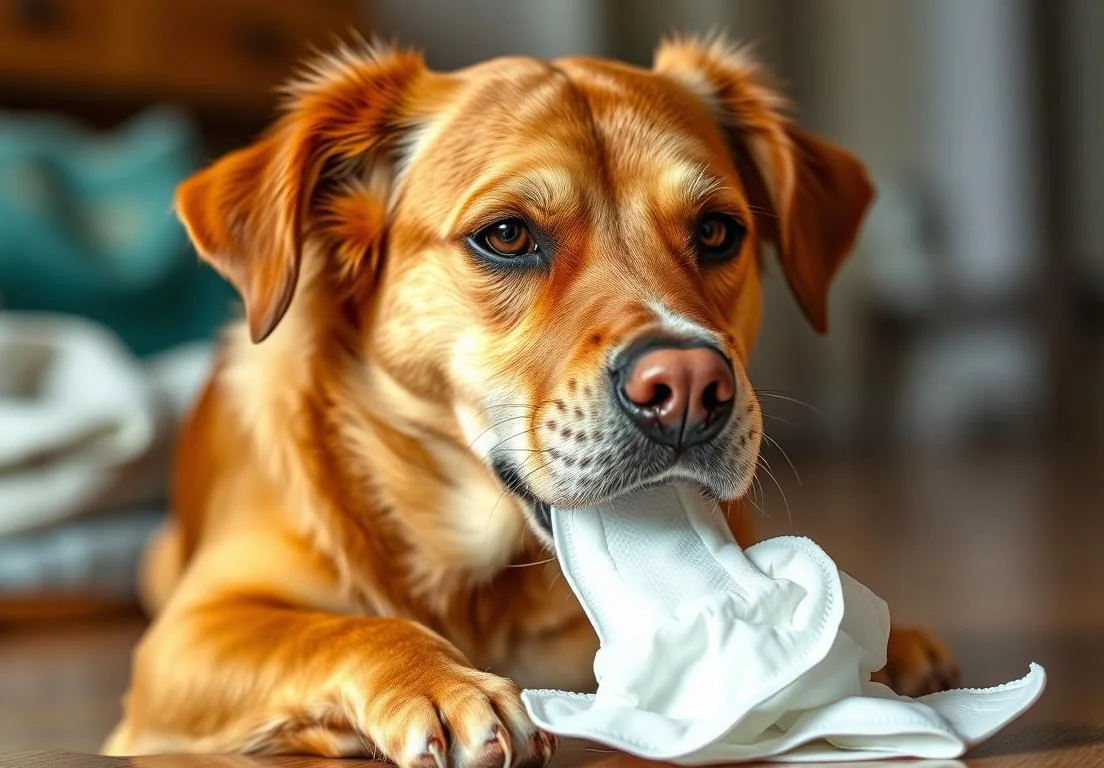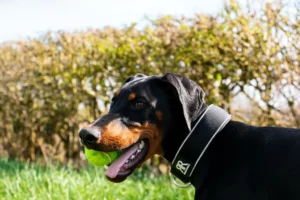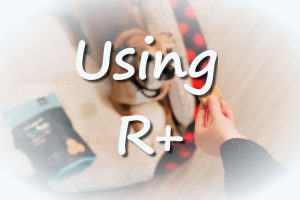Disclosure: We may earn a commission from helpful, relevant links in our content. No cost to you. See our privacy policy.
Dogs can be curious creatures, sometimes leading them to nibble on things they shouldn’t—like sanitary napkins and pads. It’s alarming, but you’re not alone in this bizarre predicament!
If your dog starts munching on sanitary products, it’s essential to act swiftly. Remove any remaining napkins or pads immediately and monitor your pet for potential signs of digestive trouble. If the problem persists or if your dog shows discomfort, consult your veterinarian. There’s a lot more to explore about the reasons behind this behavior and ways to prevent it, so keep reading to uncover the insights that will help you and your furry friend!

Why is My Dog Eating These Items
Dogs often act on instincts and curiosity, which fully explains their attraction to sanitary napkins and pads. These products carry scents from a woman’s body that can pique a dog’s interest. Dogs, being highly scent-oriented, may think these items are something worth investigating or enjoying. It’s also possible that they’re mimicking behaviors they’ve picked up, seeking out anything that smells different or unusual.
Boredom can play a role as well. If your pup isn’t getting enough exercise or mental stimulation, they might turn to anything that’s within reach—including your bathroom stash. Some breeds, particularly the more intelligent ones, require a bit more engagement, so keep that in mind.
Lastly, in some cases, it could be a sign of an underlying issue. Dogs with separation anxiety or those who have developed compulsive behaviors might seek out these items as a form of comfort. Being attuned to your dog’s specific personality and needs can help you understand why they’re drawn to these products.
What Are the Risks Involved
Ingesting sanitary pads and napkins is not just an odd quirk; it poses several potential health risks that should not be ignored.
When dogs chew or swallow these items, they can ingest non-digestible materials, which can lead to serious gastrointestinal problems.
Possible complications include
- Blockages: Pads can create obstructions in the digestive tract, particularly in smaller breeds. This often requires surgical intervention.
- Urethral Issues: Given the construction of these items, there’s a risk they can cause damage or blockage in the urethra.
- Toxicity: Some pads contain chemicals or fragrances that, while safe for human use, may be harmful to your dog.
Symptoms to watch for include vomiting, diarrhea, lethargy, or signs of pain. If you notice any of these after your dog has accessed these items, it’s crucial to consult your veterinarian immediately. The sooner you act, the better chance of a swift recovery for your furry friend.
Be proactive and keep sanitary products out of reach to reduce the likelihood of them becoming a chew toy.
How to Discourage This Behavior
It’s not uncommon for dogs to munch on sanitary napkins and pads, but it’s definitely a behavior you want to curb for their safety. Dogs are naturally curious and might be drawn to the scent, especially if they’re in heat, but there are effective ways to discourage this habit.
Keep supplies stored away : Make sure to stash any used or unused napkins in a secure trash can with a lid. Opt for a bin that’s dog-proof—think heavy-duty and high enough that they can’t reach it.
Use deterrents : Consider using bitter sprays or safe canine deterrents if your dog continues to go for these items. Applying a little to the area around where you store products can help dissuade them with the scent or taste.
Provide alternatives : Dogs often chew when they’re bored or anxious. By offering chew toys or engaging them in interactive play, you can distract them from unwanted behaviors.
Train with commands : Utilize commands like “leave it” or “no” to train your dog to avoid sanitary products. Positive reinforcement goes a long way—reward them when they listen and redirect their attention.
Increase exercise : A tired dog is less likely to get into trouble. Regular walks and play can prevent boredom and associated chewing.
What to Do if My Dog Ingested One
If your pup has managed to snag a sanitary pad or napkin, stay calm and take immediate action. First, assess the situation:
- Check for choking: Look to ensure your dog isn’t experiencing any difficulty breathing or choking. If they are, you might need to take emergency measures.
- Identify materials ingested : Knowing if they ingested just a small piece or a whole product matters. This helps in assessing potential complications.
- Monitor behavior : Keep an eye on them for signs of distress—vomiting, diarrhea, or lethargy. If any of these symptoms arise, you’ll need to act quickly.
- Contact your vet : Even if they seem fine, it’s a good move to call the vet. Describe what they ate, how much, and any symptoms they might be showing.
- Follow vet advice : If your vet recommends bringing them in, do so as soon as possible. They may need treatment to induce vomiting or further monitoring.
- Keep an eye on recovery : After consulting your vet, watch them closely for a few days. Sometimes the symptoms can develop later.
Being proactive helps keep your fur friend safe. With a few preventive measures and quick actions, you can effectively minimize risks.
How to Safeguard Your Home
Keeping your pup away from sanitary napkins and pads is essential for both their health and your peace of mind. These products can pose serious risks, including choking and digestive blockages. To start, think about where you store these items. Consider using closed trash cans or high cabinets for disposal—out of reach means out of mind for your dog.
You might also want to invest in child-proof locks for any cabinets that aren’t already dog-proof, especially in bathrooms and bedrooms. If you’re out and about, don’t leave bags with these items in your car or anywhere your dog can reach. Training your dog to stay away from these products is also a vital line of defense. Use positive reinforcement to encourage your dog to avoid even the smell of them. Consistent training can give your dog a strong cue that these items aren’t for them.
A little creativity can help, too. Why not provide your dog with engaging toys or interactive distractions to divert their attention? If curiosity strikes again, being proactive will save a lot of hassle in the long run.
Are There Alternatives to Sanitary Products
Considering eco-friendly and dog-safe alternatives makes perfect sense if you’re noticing your dog getting into sanitary products.
You might explore reusable cloth pads that you can wash and use again.
They’re not only better for the environment but also often more pet-friendly than commercial products, which can contain harmful chemicals.
Another option is menstrual cups. These are designed to be leak-proof and aren’t tempting chew toys for dogs. Plus, they eliminate waste, making them a fantastic choice for sustainability-minded individuals.
If you’re open to natural solutions, look for biodegradable pads made from organic materials. These are less likely to attract your dog’s curiosity, plus they’re easier on the planet. Investigating brands that prioritize safe packaging can also help—less enticing packaging can mean fewer accidental snacks for your furry friend.
Lastly, educational resources on proper disposal can help; locating your nearest composting service if you’re interested in eco-friendly disposal methods can take some of the stress out of management.
When to Consult a Veterinarian
Pay attention to your dog’s habits after they’ve gotten into the trash. If you notice them eating sanitary napkins or pads, be vigilant about their health. While it might seem harmless, there are some specific scenarios where you should seek a vet’s advice right away.
If your dog exhibits any of the following symptoms, it’s time to consult a vet:
- Persistent Vomiting: If your dog continues to vomit after consuming these items, it could indicate blockages or other gastrointestinal issues.
- Loss of Appetite: Not wanting to eat their regular food after scavenging can be a sign of distress.
- Lethargy: A sudden drop in energy can suggest they are unwell.
- Diarrhea or Constipation: Both can occur if a dog ingests foreign objects, including sanitary products.
Also, keep an eye out for any signs of abdominal discomfort, such as whining, pacing, or a hunched posture. If you suspect your dog has swallowed a large piece of plastic or another hazardous material, it’s best to act fast. Early intervention can be crucial to preventing serious health issues.
Alex, a passionate animal lover, has experience in training and understanding animal behavior. As a proud pet parent to two dogs and three cats, he founded AnimalReport.net to share insights from animal experts and expand his knowledge of the animal kingdom.




